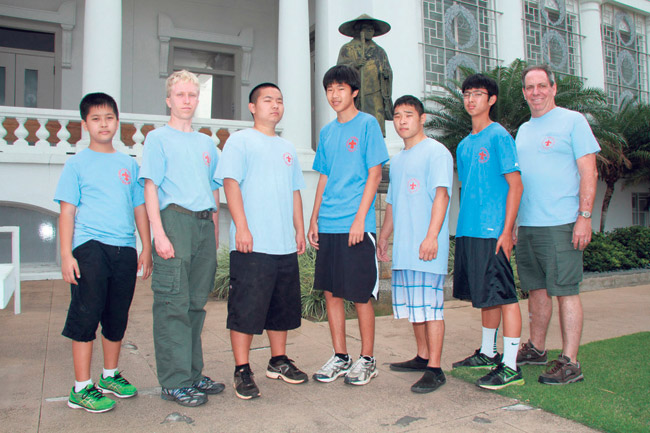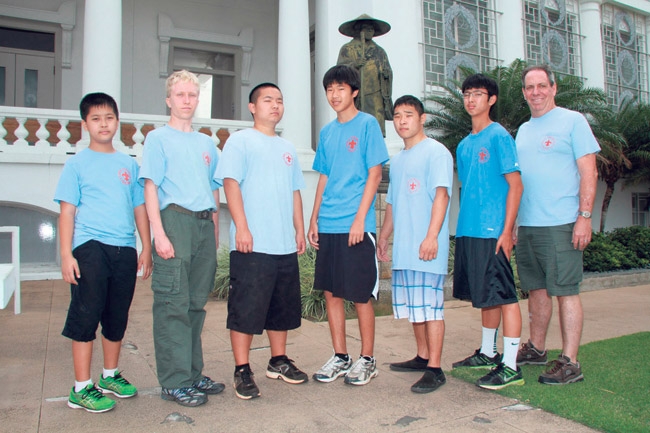Hawaii Boy Scouts Soar As Eagles
We often think of the Boy Scouts in the sepia tones we reserve for drive-in movies and tail fins on a Cadillac.
But while the Caddie’s lines are all smooth now and the films are being displayed on their head-rests, Boy Scouts of America is still going strong more than 103 years after its inception.
nm_1
Although troop numbers are down from its high of 6 million members in the 1960s (current enrollment stands at 2.6 million boys), the impact it has may be even more important in the online world kids grow up in today.
“It teaches life skills in an outdoor setting,” says Rick Burr, CEO of the Aloha Council. “Scouting is one of the few organizations that still incorporates the outdoors, and when we have researchers now coining phrases like ‘nature deficit disorder’ because kids aren’t getting out and learning the spatial concepts that nature provides, scouting has never forgotten that for kids. It is important to have them outdoors to learn the skills and develop mentally.”
The badges have changed some through the years. They offer cinematography and geocaching now, but the basics of being prepared and being leaders still prevail.
“Scouts is different than it was 50 years ago, but there are still 15,000 scouts here in Hawaii and Troop 49 is thriving,” says Mark Merriam, scoutmaster of Troop 49, which has been based out of Honpa Hongwanji Hawaii Betsuin for the past 76 years.
“Today’s kids’ opportunities to be in the outdoors are pretty limited, so to take part in an organization like the Boy Scouts and take part in the outdoors and develop the leadership skills, it develops very strong leaders. These kids are very different from when I first got to meet them seven or eight years ago.”
The proof of that lies in the unprecedented in Hawaii: honoring 12 scouts from one class with the prestigious designation of Eagle Scout. Of the hundreds of millions of kids who have gone through the program during the past century, only 2 million have achieved this level.
It is not an honor bestowed for time served, but one that must be earned.
First, there are the merit badges that indicate you have mastered a skill. You have to have 21 in all, although some of Troop 49’s Eagles have upward of 30.
“It taught me to be prepared, to bring everything you think you are going to need and to work hard at everything you do, and finish things early rather than late,” says Bryce Tsuruma, a senior at Saint Louis School.
These are not badges of the basket-weaving ilk, but ones that will make these boys not just good men, but good Americans. Badges like Citizenship in the World, which requires an understanding of international law and relations, and Environmental Science, which requires experimenting and studying of how pollution affects our world, are helping shape these young men for the world they prepare to enter upon graduation.
“Scouts has influenced me to help care for other people more, to be more conservation-minded, and when we go out camping we should leave places cleaner than we found them,” says Chris Nakagawa, a senior at Hawaii Baptist Academy.
Once the prerequisites have been satisfied, they must perform their Eagle project. This is the scout version of a master’s thesis, where a scout must find a community project that needs to be done, organize the resources to take on the project, and then lead their troops through the completion of the task.
These tasks vary from carving a new hiking trail at Papahana Kuaola in Kaneohe, to organizing a statewide robotics tournament, to repainting all the stairwells in an apartment complex for senior citizens and the disabled.
“It takes a lot of work and a lot of leadership,” says Javen Nakamoto, a recent Roosevelt graduate who organized the repainting of the three stairwells of the seven-story-high Punchbowl Homes Apartments. “You have to know your project well so you can direct people to get the job done. Jerry Ballard, the president of Punchbowl Homes, presented me with a certificate of appreciation and thanked our troop with so much emotion and called us family.”
Nakamoto, along with his younger brother Justen, are among the dozen who were recognized March 30 as new Eagle Scouts. Together, these 12 have volunteered just short of 7,000 hours of community service.
While their hard work in the community provides good short-term benefits, the leadership skills they have learned should help out the Islands for decades to come.
“There are other aspects besides teaching first aid and how to build fires,” says senior patrol leader Reid Akana, who will become the 13th Eagle for Troop 49 when he finishes his review in April. “Part of it is leadership, too, and that skill is very relevant in modern life – that is how a lot of colleges make their selection, based on leadership experience and how effectively they can lead a group.”
Evidence of this prevails with former-President Gerald Ford and New York City Mayor Michael Bloomberg having worn the medal of Eagle Scout, and before Neil Armstrong took those first steps on the moon, he strode onto a stage to be recognized with the Scouts’ highest honor.
Merriam obviously does not know what all his troop will accomplish in their new lives outside of the Scouts, but he feels sure that the precepts they have learned will direct their future.
“One of the unique things about scouting is it brings kids together community-wide who would not have known each other any other way,” says Merriam, pointing out that this class has kids from Punahou, Kamehameha, Hawaii Baptist, Mid Pac and Roosevelt. “The values these guys have learned, the Boy Scout Law, they believe in that, and it is how they live their lives, and they will continue to do that. It becomes a lifestyle: being prepared and helping other people.”







